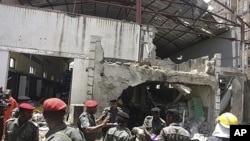Bomb attacks targeted the Abuja and Kaduna offices of one of Nigeria’s most prominent newspapers Thursday, killing seven people and injuring many others. Another bombing late Thursday in Kaduna hit a residential neighborhood, injuring several people and damaging houses.
After the explosion, the crowd that gathers around the gutted This Day newspaper office in Abuja quickly become angry. They shouted at soldiers and police, saying there is no security in Nigeria.
Among the dead in Abuja was the bomber, who drove a jeep and killed at least two security guards. Security officers say the bomb most likely was set to go off upon impact and detonated as the jeep rammed into the door. Windows in the surrounding buildings were shattered.
"The suicide bomber came in a jeep and the security opened the gate. We can’t ask them now because they are dead. We can’t find out why they opened the gate for them," said Olusegun Adeniya, chairman of the newspaper's editorial board.
Adeniya said the blast did not reach the news and editorial departments in the back of the building.
Meanwhile, in Kaduna, an eyewitness to the deadly attack there told VOA the bomb exploded just outside the This Day compound, which also houses two other newspapers: The Moment and The Sun.
President of the National Union of Journalists, Mohammad Gaber, did not comment when asked if the Islamist militant sect Boko Haram was behind the attack, but said it was clear the media in Nigeria is under siege.
"This has further confirmed our fear that journalists are not safe, media houses are not safe, so that there is need for the security agencies to be more proactive," Gaber said.
Some locals say they suspect the attacks are the work of the radical Islamist sect Boko Haram, which has been blamed for hundreds of deaths this year alone.
The group claimed responsibility for two suicide car bombings in Abuja last year; one at police headquarters and the other at the local U.N. headquarters. In Kaduna, a car bomb exploded on a busy street on Easter Sunday earlier this month, killing at least 40 people. No one claimed responsibility for that attack.
In the crowds surrounding the bombsite, however, others say the attack was a political move to distract the public’s attention from recent charges of high-level corruption.
Nigerian President Goodluck Jonathan called the attack “misguided, horrendous and wicked."





